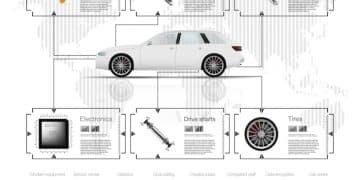Tips for avoiding common car buying mistakes

To avoid common car buying mistakes, understand your budget, research models and prices, prioritize test drives, negotiate effectively, and thoroughly review contracts before making a purchase.
Tips for avoiding common car buying mistakes are crucial when making one of the biggest purchases in your life. Have you ever felt overwhelmed at a dealership? Let’s explore how to navigate the car buying process with confidence.
Understanding your budget for a new car
When it comes to buying a new car, understanding your budget is the first step. Knowing how much you can afford will help you make a smarter choice and avoid financial stress later. It’s essential to factor in not only the price of the car but also costs like insurance, taxes, and maintenance.
Evaluate Your Financial Situation
Start by reviewing your monthly income and expenses. This overview will give you a clearer picture of what you can allocate towards a car payment. You might want to ask yourself:
- How much can I save each month for a car payment?
- What other expenses do I have that I need to consider?
- Am I willing to make sacrifices in my current spending?
Having a realistic mindset about your finances will guide your choice. Next, you should determine what type of financing suits you best. Whether you choose to pay in cash or finance the purchase over time, understanding the total costs involved is crucial.
Set a Maximum Price
Your budget should also include a maximum price you’re willing to pay. Stick to this number to avoid getting carried away when you are at the dealership. Remember, the sticker price is often negotiable, and you shouldn’t feel pressured to exceed your limits.
Don’t forget to account for additional expenses tied to car ownership. Alongside the car payment, there are important ongoing costs to consider:
- Insurance premiums
- Fuel expenses
- Monthly maintenance costs
- Registration and taxes
Each of these can take a toll on your budget if you aren’t prepared. Therefore, consider creating a monthly budget that includes all these factors to keep your finances on track.
In conclusion, grasping your budget for a new car purchase isn’t just about the price of the vehicle. It encompasses various factors and ongoing costs that can impact your financial health. With careful planning and awareness, you can make a car purchase that fits your lifestyle.
Researching car models and prices
Researching car models and prices is a vital step in the car buying process. Before you even visit a dealer, gathering information can empower you to make informed choices. Knowing what type of car you want, and the average price can save you time and money.
Identify Your Needs
Start by identifying your specific needs. Consider what you will primarily use the car for. Do you need a family vehicle, a fuel-efficient commuter, or something rugged for off-roading? By pinpointing your priorities, you can narrow down your options. Some factors to consider include:
- Passenger capacity
- Fuel efficiency
- Safety features
- Technology and entertainment options
After you have a clear idea of what you need, the next step is to explore various car models that fit your criteria. Online resources and reviews can provide valuable insights into the performance, reliability, and overall satisfaction of different vehicles.
Compare Prices
Once you’ve narrowed down your preferred models, it’s important to compare prices across various dealerships and online platforms. Websites like Kelley Blue Book or Edmunds can offer fair market values for the models you’re interested in. This understanding will ensure that you’re not overpaying.
As you research, be mindful that prices can greatly fluctuate based on factors such as location, demand, and the time of year. Therefore, checking multiple sources will give you a better sense of the going rate.
Online reviews are also crucial at this stage. They can provide feedback from other buyers about pricing and negotiation experiences at local dealerships. Reading about others’ firsthand experiences can help you build confidence when engaging in negotiations.
Furthermore, visiting local dealerships to see the cars in person can give you a better feel for them. Don’t hesitate to ask questions and gather as much information as you can. This approach ensures that you are well-prepared before making a purchase decision.
The importance of test driving

The importance of test driving a car cannot be overstated. Before making a purchase, experiencing how the car feels on the road is essential. A test drive helps you understand if the car meets your expectations in terms of comfort, handling, and overall performance.
Assess Comfort and Fit
During a test drive, pay attention to how the car fits you. Is the seating comfortable? Can you easily reach the pedals and controls? Ergonomics play a significant role in your driving experience, so it’s crucial to ensure that you feel relaxed and at ease.
Also, consider how much space is available for passengers and cargo. If you plan on using the car for family outings or road trips, ample space can make a huge difference.
Evaluate Handling and Performance
Next, focus on how the car handles. Take it on different types of roads, including highways and local streets. Test the brakes, acceleration, and steering. Some additional aspects to evaluate are:
- How does the car respond in traffic?
- Does it corner well?
- Is the ride smooth over bumps?
- How quiet is the cabin while driving?
These elements are vital to your daily driving comfort. An engaging and pleasant driving experience can greatly enhance your enjoyment of the car.
Don’t hesitate to drive multiple models. Each car has its unique characteristics, and comparing them side by side allows you to make a more informed decision. A car might look fantastic on paper, but it might not suit your driving style.
Furthermore, try to take the car on a longer drive if possible. A brief trip around the block may not reveal important factors like how the car feels during extended travel or how comfortable it remains over time. Always choose to maximize your test driving experience to truly understand the vehicle’s capabilities.
Negotiating the best deal
Negotiating the best deal when buying a car is crucial for saving money. Understanding how to approach this process can lead to significant savings. It is essential to be prepared and confident as you enter negotiations.
Do Your Research
Before you start negotiating, know the average prices of the car models you are interested in. Check resources like Kelley Blue Book or Edmunds to gather valuable information about what others are paying. This knowledge gives you leverage during discussions. You can better argue for a lower price by presenting data to support your claims. Additionally, understand the most recent deals and promotions available that could benefit you.
Be Prepared to Walk Away
One key to successful negotiation is being willing to walk away if the deal isn’t right for you. This approach shows the dealer you are serious about your budget and that you have other options. Stay firm on your budget and what you’re willing to pay. Don’t be afraid to express hesitation or doubt. Sometimes, this can prompt the dealer to offer you a better price to keep the sale.
- Set a maximum price you are comfortable with.
- Remain calm and collected throughout the negotiation.
- Use silence as a tool; sometimes, waiting can prompt a better offer.
- Be aware of upselling tactics used by the dealer.
Use these strategies to maintain clarity and assertiveness during your discussions. Always remember that it’s not just about price. Consider factors like financing options, extended warranties, and trade-in value as part of the overall deal.
As the negotiations progress, don’t be afraid to ask questions. Clarify any terms you don’t understand, and ensure everything is laid out clearly. This practice not only shows you are engaged but also helps you avoid potential pitfalls that may arise from misunderstandings.
In summary, successful negotiation is about being informed and confident. It’s okay to ask for what you want and stand firm on your limits. By applying these strategies, you will be well-equipped to negotiate the deal that best fits your needs.
Reviewing the fine print of contracts
Reviewing the fine print of contracts is an essential step in the car buying process. Many buyers overlook this critical aspect, but it can save you from future headaches. Contracts contain important details that can affect your purchase agreement, financing, and other obligations.
Understand Key Terms
Contracts often include terms that can be confusing at first. Take the time to read and understand concepts like:
- APR (Annual Percentage Rate): This shows the cost of borrowing money over a year.
- Loan Term: The duration for which you will be making payments.
- Down Payment: The upfront amount paid when you buy the car.
- Fees: These can include documentation fees, dealer fees, and more that may add to the overall cost.
Knowing these terms helps you make informed decisions. Don’t hesitate to ask questions if anything is unclear. It’s better to have clarity before signing than to deal with surprises later.
Look for Hidden Costs
Many contracts contain hidden costs that may not be obvious at first glance. Check for any additional fees that may be charged. Items like extended warranties, maintenance packages, or insurance add-ons can significantly increase your purchase price. Assess whether these are necessary or if better options are available elsewhere.
Furthermore, it’s wise to understand the cancellation policies. What happens if you change your mind after signing? Find out whether there are any consequences for canceling the deal. Being aware of your rights in the contract can empower you during the process.
Don’t rush through the review. Take your time and read the entire document. This diligence can protect you from potential pitfalls and ensure you understand what you’re committing to.
In summary, reviewing the fine print of contracts provides an opportunity to gain insights into your financial obligations and responsibilities. This can help you feel more comfortable with your purchase, knowing you have made an educated choice.
FAQ – Common Questions About Buying a Car
Why is it important to understand my budget before buying a car?
Knowing your budget helps you avoid overspending and ensures you choose a car that you can afford without financial strain.
What should I consider when researching car models?
Consider factors like your specific needs, fuel efficiency, safety features, and how well the model fits your lifestyle.
How long should I test drive a car?
You should aim for at least 20-30 minutes, driving in different conditions to fully assess comfort and handling.
What are some tips for negotiating the best deal?
Do your research on prices, be prepared to walk away, and communicate clearly about your budget and needs during negotiations.





